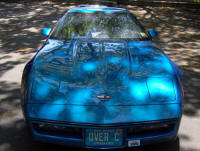RIKLBLOG
|
| Tomorrow |
| 04 March 2009 |
| Yesterday |
| Index |
| Eventide |
| SETI League |
| PriUPS Project |
| Bonus! |
| Contact |


Chocolate Lab
There's something about Hershey's chocolate that prompts me to haul out the ancient triple-beam balance. But I'm getting ahead of myself, as this blogitem begins, uncharacteristically, with the subject of virtue. Even more uncharacteristically, my virtue. I was driving into the office in the car car when on the radio came an advertisement, or perhaps a PSA (Public Service Announcement). It was sponsored, or perhaps, offered, by the folks who run Indian Point, the local nuclear power plant, and it dealt with conservation of electricity, the stuff they get from the nuclei of their atoms. Unlike oil, the world isn't short of nuclei, but there are certain difficulties attendant upon converting them to usable power. Their notion was to explain how to conserve energy, and they mentioned several methods.
The one that struck me was the conservation of soda cans. Unlike many "conservation laws" that are of a physical character and cannot be violated, soda cans can be recycled or discarded. If discarded, a lot of energy is wasted, which energy must be replaced by—you guessed it—the folks at Indian Point. In an attempt to get us to save cans and energy, they presented a number of facts.
The process of converting bauxite (the source of aluminum that makes up 8 percent of the earth's crust) into aluminum is an energy-consuming one—requiring roughly 7.5 kilowatt hours for each pound of virgin aluminum. Open-cast mining of bauxite also leads to deforestation and destruction of ecosystems. On the plus side, aluminum is 100 percent recyclable, and creating new cans from old ones requires only 5 percent of the energy needed to produce virgin aluminum. In the United States, around 35 percent of aluminum products contain recycled aluminum.
Of course they didn't have an indented paragraph with blue letters explaining this since it was on the radio. It was simply a verbal exhortation to recycle cans. I sat through it feeling virtuous because I don't drink soda. If I did, I would surely take care to save and recycle the cans. Just as my Prius emits smug instead of smog, my lack of a carbonated-beverage habit has always caused me to raise my snoot a calculated .02 radians when beverages are offered, and I select "Water, please, from the tap."*
When I arrived at the office, I went, as I often do, to the chocolate drawer, grabbed a couple of Hershey's Kisses, and unwrapped and consumed them with little thought.
WAIT A MINUTE!
Was that Mr. Smug Snoot unwrapping a Hershey's Kiss and discarding the aluminum foil wrapper in the unrecycleable trash? Was I committing an awesome item of lush malfeasance? My aura of virtue suddenly transmogrified into a miasma of profligacy. I resolved to determine if absolution was necessary, followed by a change of my ways. At the end of this blogitem, I shall have made that decision. As usual, it involves some calculations...
Which calculations I tried to avoid by looking on the web. The consensus seems to be that 20 million Kisses are manufactured daily, consuming 133 square miles of aluminum foil. I saw this in many places, and, of course, it is totally meaningless since the foil thickness and therefore its weight is never mentioned. In short, I had to do the research myself. The research would involve unwrapping a large number of the subject confections, segregating the wrapping materials, and determining just how much aluminum waste was involved. Tragically, at the end of the research, there would be a large number of unwrapped chocolate blobs that could not be preserved in their original state, and would have to be disposed of in some manner.
Experimental Protocol
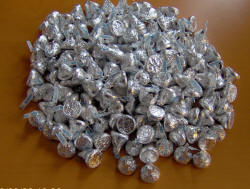 |
Decant bag of Hershey's Kisses onto laboratory surface and separate randomly into aliquots of 10 each to assess uniformity. Result: The heaviest group was 47.0 grams, the lightest 46.3. The average was 46.7 grams. As usual, Hershey's has their manufacturing processes under control. No mutant Kisses were observed in the lot. |
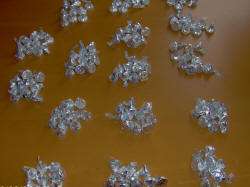 |
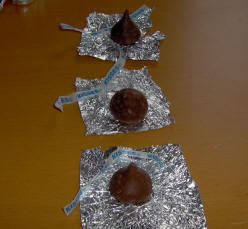 |
I carefully unwrapped several specimens in an
attempt to verify the statistic found on the web. I have
no way to determine the accuracy of the "20
million" per day but I was able to measure the areal coverage of
the aluminum, which was 2.5 inches square, plus/minus a tiny bit
due to crinklage. So each wrapper is 6.25 square inches.
A square mile is (5280*12*5280*12) = 4 billion
square inches. 133 square miles, therefore, is 534 billion
square inches, which, divided by 6.25, would require 85 billion
Kisses to be manufactured to consume all the foil.
Be suspicious of web "facts." This one was repeated
many times on many sites, and is off by a factor of about four
thousand. |
|
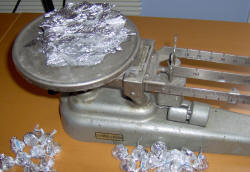 |
Here is the result of all the unwrapping and segregating. It turns out that, to the precision of the scale and the patience of the experimenter, each Kiss-wrapping piece of foil weighs very close to 100 milligrams. | |
 |
As often happens in experimentation, materials can't be reused. In this case, the paper "plumes" were discarded and the Kisses sacrificed for Science. | |
Analysis
I did have to accept one web statistic. Since I don't drink soda, I was unable to find an empty can to weigh. I read that it's typically about 14 grams, or the aluminum-equivalent of 140 Kisses, roughly a 1-1/2 pound bag. Therefore, one would have to eat that many of the chocolate dollops and discard their wrappers to equal the waste of one discarded soda can. Given that soda drinkers (I am told) typically have two or more cans per day, they would have to search very diligently for recycling facilities each time, to avoid wasting a lot more aluminum than I do with my Hershey's Kiss consumption. Therefore:
My virtue is intact and my snoot remains resolutely elevated.
If it requires 7.5 kilowatt-hours to refine a pound of aluminum, then the cost in electricity of that pound is about a dollar, at least if one were going to refine it at home. (Aluminum refineries are typically located near sources of cheap electricity for obvious reasons.) Each Kiss wrapper, then, requires 1.6 Watt-hour to refine, or about half the energy contained in an AA battery. Considering the cost of AA batteries and the throwaway nature of Kiss wrappers, I think there is a fortune awaiting anyone who can figure out how to turn the wrappers back into bauxite and recover the energy to power our flashlights and teevee remotes.
*I'm thinking of adding another degree of elevation since I have learned, just this morning from CNN, that "For many during a deepening recession, conspicuous consumption is out and frugality is the new black."
|
Special Advertising Section Please buy this lovely blue Corvette ZR1! Now, with Collector's Kit |
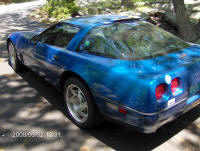 |
NP: "Songs from a Marriage" - Amy Rigby
| © 2009 |
| Richard Factor |
